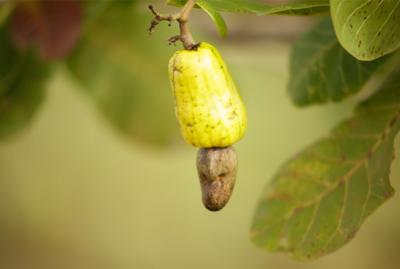- English
- Français
- Português
Country Update: New Growth and Focus on Cashew in Cote d' Ivoire
Cote d’ Ivoire is a giant in the global cashew industry: In 2013, the total raw cashew nut (RCN) production in the country reached 500,000 tons, accounting for 20% of global production. It currently stands as the largest cashew producer within Africa and the second largest cashew exporter in the world. The Ministry of Industry and Mines predicts that production in Cote d’ Ivoire will continue to grow, reaching an estimated 616,000 tons in 2016 and 1,030,000 tons in 2020.
 Cote d’ Ivoire also has the potential to excel in the sector of cashew processing. In 2012, the country’s installed capacity of 52,000 tons accounted for 11% of total production. In reality, only about half of that installed capacity was utilized, with just over 5% of production in 2012 being transformed within the borders. Currently, more than 90% of cashew produced in the country is exported as raw cashew nut.
Cote d’ Ivoire also has the potential to excel in the sector of cashew processing. In 2012, the country’s installed capacity of 52,000 tons accounted for 11% of total production. In reality, only about half of that installed capacity was utilized, with just over 5% of production in 2012 being transformed within the borders. Currently, more than 90% of cashew produced in the country is exported as raw cashew nut.
The country’s current president, His Excellency Alassane Ouattara, has designated cashew as a key element in the newly developed National Development Plan, which aims at establishing Cote d’ Ivoire as a key emerging economy in the World by 2020. Specifically, the plan focuses on beefing up the processing capacity within the country to consequently increase RCN transformation before export.
At the Invest in Cote d’ Ivoire 2014 forum in late January, the Ivorian Minister of Agriculture, Mamadou Sangafowa Coulibaly, stated the climate within the country “is favorable for agriculture". He continued by asserting that agriculture remains an incredibly important aspect of Cote d’ Ivoire’s economy, employing nearly 2/3rds of the population and creating 25% of the wealth. Furthermore, the Honorable Minister revealed untapped potential by stating that only 40% of the arable land is cultivated. Cashew production can certainly play a strong role in taking advantage of favorable climate conditions and un-used arable land.
In an effort to spur growth within the cashew sector, the Ivorian government recently enacted new reforms and re-organized the governing bodies. First, the regulatory authority of the cashew and cotton markets was replaced with the Council of Cotton and Cashew Nuts (CCA) which is tasked with the following responsibilities; to optimize the production, improve the quality of the cashew nut, ensure a remunerative price to producers, ensure the transparency and reliability of the marketing system, increase the value added by processing and improve the framework and living conditions of the producers. Another objective of the new body is to establish a multi-stakeholder body which will bring together representatives of producers, cooperatives, exporters, buyers, and processors.
One of the first activities of the CCA was to identify and approve all of the primary operators and shops involved in the cashew sector within Cote d’ Ivoire. By early February, official documents stated that 705 organizations had already been approved; 453 of whom where individual buyers, 199 cooperative societies, and 53 commercial companies. The list of licensed buyers has been published on the CCA website, promoting greater transparency in the sector than in past years.
The CCA also handles price control for the cashew sector, basing minimum prices on a variety of factors. Normally, the producers should receive 60% of the FOB price that is marketed at the port. Traceability of transactions is an important aspect in getting a read on the market and setting price controls, therefore the CCA has introduced a variety of new required documentation for this season. All transactions must now be tracked with a receipt of storage, the allotment, and the establishment of The marketing will be around central stores with the use of new market instruments such as the receipt of storage and allotment.
The Ministry of Industry and Mines has the objective of transforming 35% of the production, or an estimated 230,000 tons by 2016, and 100% of local production by 2020. In order to meet these objectives, the Minister has put together a comprehensive framework for investment. The first aspect of this framework is the establishment of a fund of investments that are to be directed toward increasing processing capacity within Cote d’ Ivoire. In addition, a system of receipt of third party warehousing detention will be established to ensure the agricultural appropriations of the stocks, traceability, and the availability and quality of cashew nuts.
The Let us hope that investors, bankers and other potential industry stakeholders sieze the opportunities present in Cote d’Ivoire to increase transformation, and in turn transform a sector and livelihoods throughout the country.



